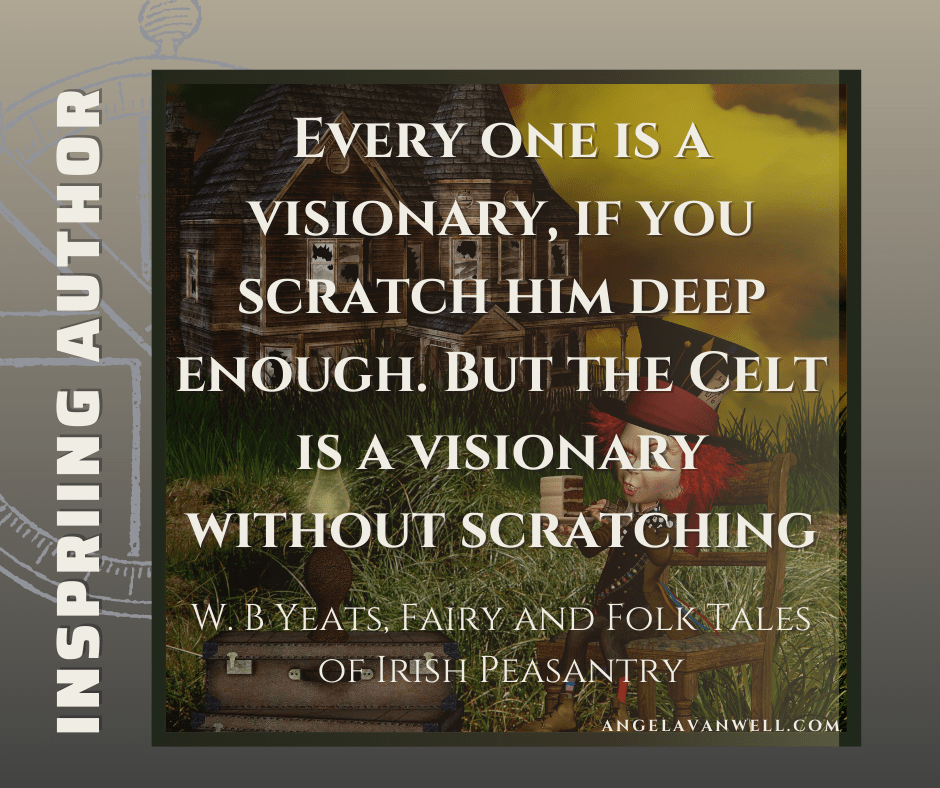Would you cross, let alone build, on a fairy ring? Do you plead with the elemental powers to take your love away? Have you heard the faery cry, inviting you to come away from the world filled with sorrow? William Butler Yeats explored the oral history of Ireland and added to it. He was an Irish poet, was born into an artistic family, surrounded by artists and poets. His early works focused on Irish mythology and folklore as he was one of the artists responsible for the Irish Literary Revival and creation of the Dublin Abbey Theatre.

It is those ancient tales and his accounts of collecting Irish myth and folklore that I appreciate the most. It is not surprising as I love myths and the twists and turns they undergo when used in modern poetry, novels, TV series, and movies. The collection, Fairy and Folktales of the Irish Peasantry, is filled with real-world accounts of encounters with the faery realm.

He listened to the stories of his home countrymen and wrote them faithfully. The collection of stories was a connection to the Irish identity, a unifying piece of his country. He seemed to interpret the faery realm and the realm of the dead. And later, when he moved his focus to mysticism, he sought to find more answers.
Come away, O human child!
To the waters and the wild
With a faery, hand in hand,
For the world’s more full of weeping than you can understand.
W. B. Yeats, The Stolen Child
Yeats wrote Fiary and Folk Tales of the Irish Peasantry in a dreamlike quality. Similar to a ghost story in events shared by individuals who experienced a faery interaction. Many of the events shared were dark and troubling, perhaps a reflection of the times. Children stolen away, changelings left in their place; of the hardships of life and outwitting the faery folk; or a man ending his vices after interacting with faery folk. Stories where Mermen keep souls in cages under the sea, and priests are heroic. A mixture of tales based in late nineteenth century beliefs.
If you would like to read the collection, it is available at Project Gutenberg: Fairy and Folk Tales of the Irish Peasantry by W.. B. Yeats I suggest you read Soul Cages by T. Crofton Croker. It is too long of a short story to share here, but a unique tale of a merman keeping the souls of drowned sailors.
“when I see a good storm coming on, to set a couple of dozen of these, and then, when the sailors are drowned and the souls get out of them under the water, the poor things are almost perished to death, not being used to the cold; so they make into my pots for shelter, and then I have them snug, and fetch them home, and keep them here dry and warm; and is it not well for them, poor souls, to get into such good quarters?”
T. Crofton Croker, The Soul Cages
Excerpt From: “Fairy and Folk Tales of the Irish Peasantry.” Apple Books.
If you are interested in learning more about Yeats’ interest in Irish Folklore and readings of several of his works, The National Library of Ireland is hosting a talk next Friday: National Library of Ireland Talk
I look forward to their view of Yeats’ works and the pieces they will be sharing.
Happy Reading!
Heaven and Fairyland—to these has Biddy Hart given all she dreams of magnificence, and to them her soul goes out—to the one in love and hope, to the other in love and fear—day after day and season after season; saints and angels, fairies and witches, haunted thorn-trees and holy wells, are to her what books, and plays, and pictures are to you and me.
W. B. Yeats, Irish Fairy Tales

Leave a Reply